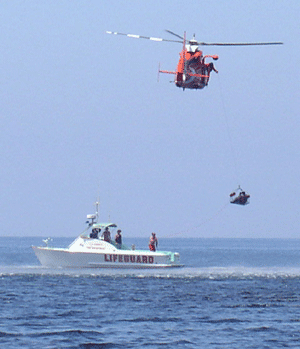The best way to manage a diving accident is to prevent it!
 There are many things that divers can do to reduce their risks in diving and decrease the probability of being involved in an accident.
There are many things that divers can do to reduce their risks in diving and decrease the probability of being involved in an accident.
Every diver should be encouraged to seek out information on diving accidents and their causes. This can help divers learn about their potential risks and how to mitigate them. There are many sources for this type of information all the way from your local dive instructor to Diver’s Alert Network (DAN) and dive training organizations.
Other areas that divers can focus on are their comfort levels, skill levels, and personal health & fitness. (Note: Data from DAN shows that in over 25% of all diving fatalities cardiac problems were the proximal case of death, and in 60% of these cases the diver had noted fatigue, distress, shortness of breath, chest pain, or not feeling well prior to the fatal dive.)
One of the missions of the USC Catalina Hyperbaric Chamber is to review the files of diving accidents brought to the Chamber, look for common problems or causes, and present that information to the diving community in an attempt to prevent people from making the same mistake others have made in the past.
A review of diving accidents presenting to the USC Catalina Hyperbaric Chamber from 1995 – 2000 showed that panic was a common factor in most of the serious cases (air embolisms, near drowning, and drowning). What started these divers on their road to panic? In general it was a minor problem, or problems, that escalated to a point where the diver lost control and panicked. We feel that divers who work at increasing their comfort levels, improve their skill performance, and understand their own limitations will be safer divers. What follows are suggestions for both divers and instructors which may help in the prevention of future diving accidents:
Increase Your Comfort Level
Divers:
- Honestly evaluate your comfort level
- Improve your comfort level:
- Practice skills you feel uncomfortable with
- Spend time in the water without your gear
- Make sure you are comfortable with your gear before entering the water
- Relax at the surface before descending
- When you reach the bottom, relax make sure everything is still fine with yourself and your gear
- If you start to feel uncomfortable:
- Stop, relax, figure out what the problem is
- Fix the problem or ABORT the dive
Instructors:
- Ensure students are comfortable in the water, with and without gear
- Do not pass students on to open water if they are not comfortable in the water
Improve your Skill Performance
Divers:
- Honestly evaluate your skill levels
- Repetition (> 12x) of a skill is required to reinforce and retain the skill:
- Practice does not make PERFECT
- Only perfect practice makes PERFECT
- Ask divers/instructors with greater skill levels to assist you in improving your skills
- Practice basic & emergency skills with buddy
- Insist on enough pool time to give you and your classmates enough time to really practice skills
Instructors:
- Give students enough pool time to really practice skills
- Offer supervised pool time to allow divers to come and practice skills
- Offer seminars that focus on reinforcing various skills
Understand Your Personal Health and Limitations
Divers:
- Honestly evaluate your own limitations
- Honestly evaluate your health and fitness with consultation with your physician
- Work with more experienced divers to gradually increase your diving skills and range
- Work up to more difficult & deeper dives
- Do not expect to be instantly qualified for any dive upon receiving an open-water certification
- Know your buddy’s limitations as well as your own
- Perform Risk/Benefit Analysis of dive
- Never hesitate to call or ABORT a dive
Instructors:
- Get students to evaluate their own limitations, and how they can move beyond them
- Teach analysis of:
- Dive Sites, Environments, & Equipment
- Risks and Benefits
- Instill in your students a healthy respect of the water
- Teach and reinforce that it is OK to call or ABORT a dive